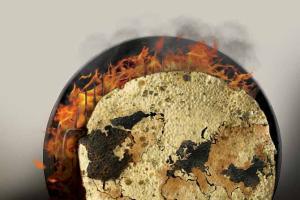Storms in Europe might have ended the unprecedented heatwave that killed hundreds across nations, but experts warn global warming means such heatwaves will be common

Illustration/Uday Mohite
With rising temperatures scorching places from Europe to Africa, the Arctic, parts of Scandinavia and Asia, it's being called the global heatwave.
ADVERTISEMENT
The world is baking and scientists have warned of a domino effect if global temperatures rise more than 2°C above pre-industrial levels, leading to hothouse conditions and higher sea levels. A report, Trajectories of the Earth System in the Anthropocene, published recently in the National Academy of Sciences, has said hothouse temperatures could stabilise 4°C to 5°C higher than pre-industrial levels, reports CNN. The heatwave is also part of a larger heatwave, caused in part by the jet stream (scientists say global warming has altered the strength and path of the winds) being weaker than usual, allowing hot high-pressure air to linger in the same place. Experts warn that such heatwaves will now be the norm.
Americas
At least 70 deaths in Quebec, and 34 in Montreal, Canada in June-July, were heat-related. On 6 July, the temperature at USA's UCLA was 43.9°C, breaking the all-time high record of 42.8°C in 1939. The Mendocino Complex fire comprising twin blazes has ravaged almost 300,000 acres, becoming California's largest wildfire.
Scandinavia
On 30 July, the Swedish nuclear power plant Ringhals-2 was shut down, as ocean waters were too hot to cool it. Wildfires have also raged on here and in Norway, where the government has also imposed water restrictions. Water levels in Denmark lakes have gone down by half a metre.
UK
The hottest day was July 26 when temperatures were 35.3°C in Faversham, Kent. Railway tracks buckled due to the heat and some roads had meltdowns. "There's no question human influence on climate is playing a huge role in this heatwave," Prof Myles Allen, climate scientist, University of Oxford, told The Guardian.
Europe
In parts of Portugal, temperatures climbed to nearly 47°C last week, just off the country's record of 47.3°C. The extremely high temperatures, caused by an influx of hot air from Africa, also carried loads of dust from the Sahara Desert. The heatwave has brought drought and wildfires to Europe from Greece, where 91 people died in a fire in July. Flames have consumed more than 1,000 hectares of forest, an area the size of over 1,200 soccer fields in Portugal.
Spain also issued warnings as temperatures were expected to reach 45°C. The toll from the heatwave in Spain was nine in just a week. Four nuclear reactors in France were shut down because of the heat. Thousands of fish have died in the Swiss sections of the river Rhine, and in the river Alster in Hamburg, Germany, as the rising heat has reduced oxygen levels in water, reported the BBC. Police in Zurich are urging owners to buy shoes for their dogs, to protect their paws, reports say.
Asia
At least 120 people died from heat-related causes and 22,000 had heat stroke in Japan. Many areas had temperatures over 35°C, and Kumagaya recorded a maximum temperature of 41.1°C. In South Korea 42 people died due to the heat. In China, tonnes of sea cucumber, and thousands of fish, have been killed due to the heatwave.
2018 is shaping up to be one of the hottest years on record, with new temperature records in many countries. This is no surprise. The heatwaves and extreme heat we are experiencing are consistent with what we expect as a result of climate change caused by greenhouse gas emissions. This is not a future scenario. It is happening now Elena Manaenkova, Deputy Secretary-General, World Meteorological Organisation
If we cannot find a way to mitigate the climate change (reduce the heatwave days) and help people adapt to heatwaves, there will be a big increase of heatwave-related deaths in the future, particularly in the poor countries located around the equator Yuming Guo, Monash University
The good news is that if we mitigate greenhouse gas emissions under scenarios that comply with the Paris Agreement, then the projected impact will be much reduced Antonio Gasparrini, London School of Hygiene & Tropical Medicine
Catch up on all the latest Mumbai news, crime news, current affairs, and also a complete guide on Mumbai from food to things to do and events across the city here. Also download the new mid-day Android and iOS apps to get latest updates
 Subscribe today by clicking the link and stay updated with the latest news!" Click here!
Subscribe today by clicking the link and stay updated with the latest news!" Click here!






